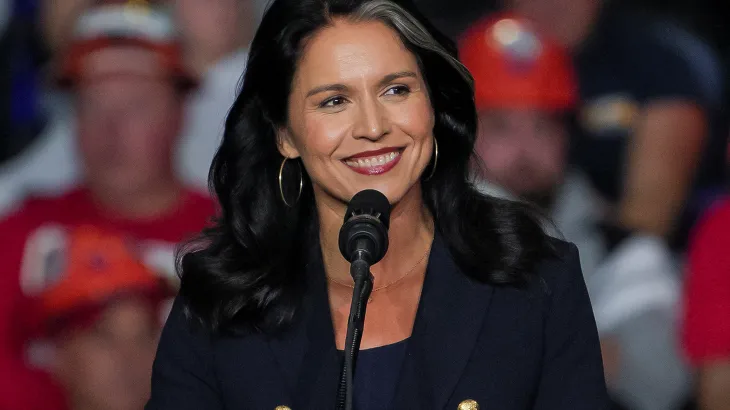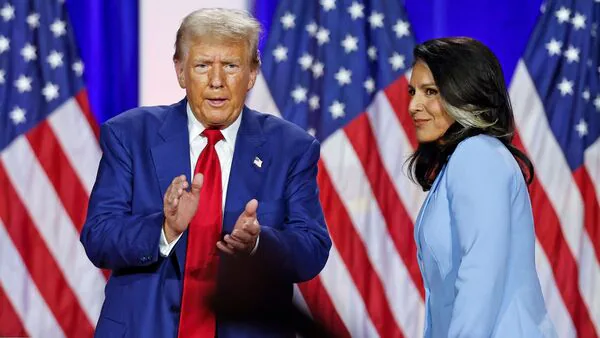Key highlights:
President-elect Donald Trump has made one of the most unexpected nominations this date: former Congresswoman Tulsi Gabbard will now become the Director of National Intelligence (DNI). Thereby, she will become the first Hindu to head 18 intelligence agencies in the United States. The move is not only focusing on her different background but also brings attention to her past clarifications regarding her heritage.
Clarifying her heritage:
Tulsi Gabbard frequently gets identified with Indian culture because of her being a Hindu and is also an active participant in programs that relate to the Indian culture. She clarified she is not of Indian origin. April 12, 1981 Tulsi Gabbard was born in Leloaloa, American Samoa. She was two when Gabbard was transferred to Hawaii. Her mother, Carol Porter Gabbard, is from a multicultural marriage and has adopted Hindu names for all her children. Tulsi’s father, Mike Gabbard, is of Samoan and European descent. She consciously declared in 2012, “I am not of Indian origin,” to put to rest speculations about her background.

Political Rise and Military Career
Gabbard is also a second-generation military member and served in the Army National Guard for over twenty years; she has two tours in Iraq and one in Kuwait. Gabbard began her political career when she won a seat in Hawaii’s House of Representatives at the age of 21, where she became one of the youngest state legislators in U.S. history. In 2005, she earned the Combat Medical Badge for her time in a combat environment while working with troops during Operation Iraqi Freedom III, having been under direct enemy fire.

History of Congressional Service
In 2013, Gabbard became the first Hindu and first American Samoan elected to the U.S. Congress in Hawaii’s 2nd Congressional District. During her tenure, she served on the House Homeland Security Committee, during which time she gained experience on matters relating to national security issues. Her congressional service was characterized by her advocacy on non-interventionist foreign policy and veterans issues.
Presidential Campaign and Party Switch
Gabbard has been thrust into the national spotlight in her 2020 presidential campaign, where she highlighted a platform based on peace and non-interventionism. She dropped out of the race and endorsed Joe Biden, but in 2022, she claimed ideological differences with the Democratic Party, which she labelled as being “completely controlled” by “an elitist cabal of warmongers driven by cowardly wokeness.” She then went on to endorse Donald Trump, embracing his foreign policy approaches.
Appointment as National Intelligence Director
President-elect Trump in nominating Gabbard as DNI is evidence of his confidence in her ability to lead and shares a common vision for the security of this nation. She would directly oversee the coordination of the nation’s intelligence community, comprised of 18 agencies, from such a position. Ms Gabbard welcomed the opportunity and was willing to take her “fearless spirit” into the intelligence community.
Scandals and Controversies
Gabbard has not been free from controversy in her political career. In 2019, during her presidential campaign, Hillary Clinton, the former Secretary of State, questioned Gabbard’s meeting with President Bashar al-Assad of Syria, insinuating that Russia was grooming her as a third-party candidate. She rejected the allegations that Clinton termed her the “queen of warmongers.” She also faced several criticisms over a meeting with Syrian President Bashar al-Assad in 2017, in which she was partly criticized by both the liberal wing and the conservative wing of the political aisle. Regardless of these controversies, Gabbard has continued to maintain her stance on non-interventionist foreign policies.
Cultural and Religious Identity
Gabbard’s Hindu faith has been a significant aspect of her public identity. She has participated in various Hindu cultural events and has been seen chanting Hare Krishna, reflecting her spiritual practices. Her faith has also led to misconceptions about her heritage, prompting her to clarify that she is not of Indian origin. This distinction is important in understanding her cultural background and the diversity she brings to her roles in public service.
Implications of Her Appointment
Her nomination to DNI is historic not only because she’s the first Hindu to assume that position but also because of her different political trajectory from a Democratic Congresswoman and now a member in a Republican administration. Her appointment could have an impact on the way U.S. intelligence policy goes, especially on its non-intervention approach. But her previous attacks on U.S. foreign policy as well as her meeting with Assad may draw challenges at the confirmation process in the Senate.
Conclusion
Tulsi Gabbard’s journey from clarifying her heritage to being nominated as the Director of National Intelligence reflects her diverse background and commitment to public service. Her nomination is a testament to her unique perspective on national security and foreign policy. As she prepares to take on this significant role, her past experiences and stances will undoubtedly shape her approach to leading the U.S. intelligence community.
For Latest News Updates Click Here
